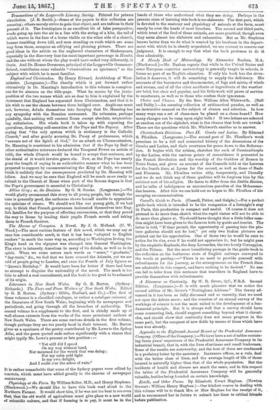England and Christendom. By Henry Edward, Archbishop of West- minster.
(Longmans.)—The charity which is put forward rather obtrusively in Dr. Manning's introduction to this volume is conspicu- ous for its absence on the title-page. What he means by the juxta- position of the two names which are so dear to him is explained by the statement that England has separated from Christendom, and that it is his wish to see the chasm between them bridged over. Anglicans must not, however, delude themselves into fancying that Dr. Manning has any sympathy with the Reunion movement. He reiterates, perhaps painfully, that nothing will content Rome except absolute, unquestion- ing submission. His whole book is taken up with repeating the querulous, despairing self-assertion of the Pope and the Papacy. After saying that " the only system which is stationary is the Catholic Church," and after gently accusing Dr. Posey of profaneness, which "savours not of the Spirit of God," for an attack on Ultramontanism, Dr. Manning is consistent in his admission that if the Pope by Bull or other authoritative utterance declared the Temporal Power an article of faith, the whole Church would be bound to accept that sentence, and the denial of it would involve grave sin. Now, as the Pope has nearly gone the length of saying in an authoritative manner what ho has been prepared to support by excommunicating the King of Italy, we cannot think it unlikely that the consequences predicted by Dr. Manning will follow. And we may be sure that England will be much more ready to submit to the Church of Rome when part of the Roman dogma is that the Pope's government is essential to Christianity.






























 Previous page
Previous page